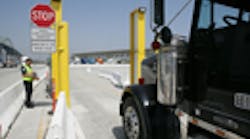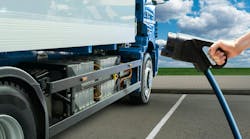The California Air Resources Board (CARB) plans to allocate more than 75% of some $1 billion in public bond funding to reduce pollution from diesel-powered commercial trucks. The remaining 25% is earmarked for diesel emission reductions from ships, harbor craft and locomotives.
The agency said it’s proposing an initial $25 million in diesel pollution reduction projects for the South Coast, Central Valley, San Francisco and San Diego air districts, mostly for truck retrofit and replacements. The plan will be voted at the group’s next hearing on Jan. 24. If approved, the $25 million would replace some 345 trucks and retrofit a further 650, according to the agency’s calculations.
“This strategy puts the lion’s share of the dollars where they're needed most: on trucks traveling from the state’s ports and along our major transportation corridors,” said CARB chairman Mary Nichols. “Within months of passing a new regulation aimed at cleaning up port trucks we are following through with much-needed funding to help drivers retrofit and replace older, dirty engines.”
Those monies come from Proposition 1B, passed by California voters in Nov. 2006, which authorized spending a total of $20 billion for highway improvements, congestion relief, expanded public transit, safer rail crossings and improved anti-terrorism security at shipping ports. Under Bond 1B, CARB is authorized to spend a total of $1 billion on air quality improvement projects in California’s major trade corridors, the agency said.
Initial trucking industry response to CARB’s plan is positive. “By investing this initial $25 million, focusing on the most cost-effective, quickest route to cleaner air, California will be able to maximize its investment in cleaning up the air while keeping vital freight moving,” said Allen Schaeffer, executive director of the Diesel Technology Forum. “This funding measure underscores the importance of clean diesel technology to meeting the state’s energy and environmental challenges of both today and tomorrow.”




